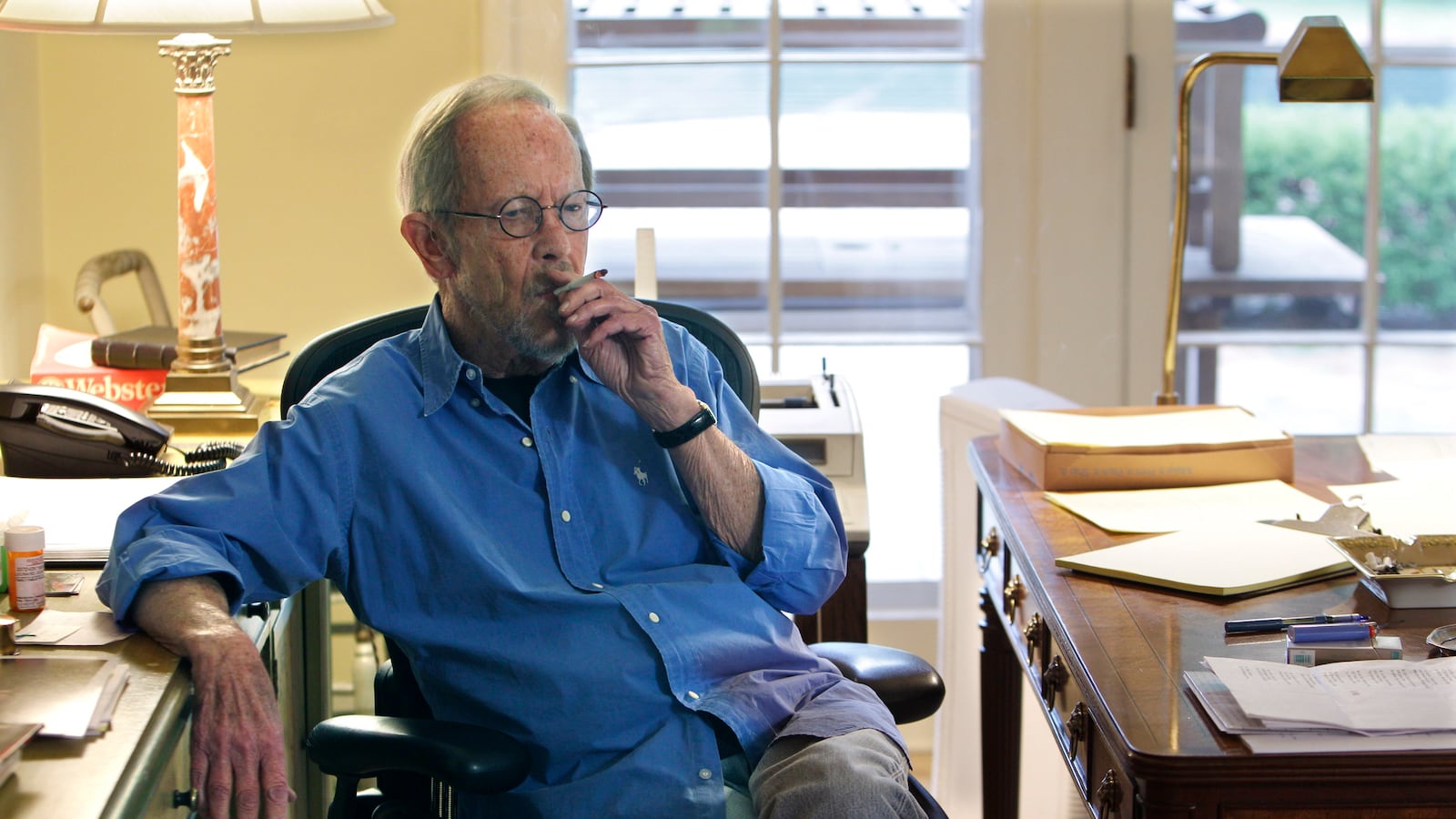Elmore Leonard was cool. He was cool on the page, and the one time I ever met him, he was cool in person. Like all truly cool people, he didn’t seem to work at it. It just came naturally.

Before he died this morning at 87, he had written more than three dozen novels and probably hundreds of short stories. A good many of those novels and stories were made into films that ranged from Westerns (Hombre, 3:10 to Yuma) to crime features (Get Shorty, Out of Sight). Screenwriters surely loved working on scripts based on Leonard’s lean prose. The plots came trimmed of fat, and the crisp, funny dialogue was already there on the page. And he always packed a lot into a small space: the television series Justified was inspired by a single Leonard short story, “Fire in the Hole.” As far as screenwriters were concerned, adapting him to the screens big or small must have seemed like going on vacation.
Certainly that was the way it felt to someone who read him simply for pleasure. Some of the books were better than others, but all of them were the work of a pro who didn’t want his readers to have to do the heavy lifting. Put another way, he wanted the reader to get his or her money’s worth, and so even the worst were satisfying.
Some of Leonard’s protagonists were smooth operators (Chili Palmer) and some were charming bumblers (Out of Sight’s feckless bank robber Jack Foley), but Leonard found ways to make all of them memorable with just a few lines of description and dialogue. He didn’t waste time on pretty writing. Everything in a Leonard story was there to propel the plot along, and his books sped along like vehicles in a frictionless universe.
When I interviewed him in 2002, I asked if he wrote with the movies in the back of his mind. His reply, like all of his conversation that day, was terse, to the point, and not a little funny:
“Back when I was just starting out, they were in the front of my mind, because I wanted to make some money. Now it’s just my style: writing in scenes, always from one character’s point of view, moving the story with dialogue—like a movie.”
He had flown into New York City from his home outside Detroit to promote a new book of short stories, When the Women Come Out to Dance. The city was in the midst of an unpredicted snowstorm, and by the time Leonard had walked from his publisher’s office to the restaurant, his loafers were all but ruined. He didn’t complain, just took off his Kangol cap, sat down to lunch, and asked what I wanted to know. I was impressed.

Unlike a lot of contemporary short fiction, the stories in that new book were all plot-driven, like something you might have read in the old Saturday Evening Post. “Exactly,” Leonard said, “or pulp magazine stories.” That was the milieu he came from: the paid-by-the-word grind of the hack writer. His first story, a Western, appeared in Argosy in 1951. Over the course of a long and ultimately successful career, Leonard took the rudiments of hackdom to the level of art.
I asked him if there was still a market for such stories. “I don’t know,” he said. “A New Yorker editor used to ask me for stories, and I’d say, ‘I don’t your kind of stories.’ My stories have endings.”
So why do it?
“People ask me, “Why are you still writing books?” Like I’m still only writing to make money and as soon as I have enough I’ll quit and go fishing? I like to write books. It’s the most satisfying thing I do. And I can write anything I want, although I don’t take that too far, because I’ve always had a commercial bent. I’m not going to write for posterity. I’m going to write to make a buck.”
He really never thought of posterity?
“No,” he said. “But I do think my stuff will last longer than a lot of stuff I read today.”
Not long before that interview, Leonard had published a short list of rules for writing. Like his books, that list got right to the point. No. 1 was, “Never open a book with weather.” No. 3 was, “Never use a verb other than ‘said’ to carry dialogue.” My favorite was No. 10: “Try to leave out the part that readers tend to skip.”
I asked him if he ever broke his own rules.
“Oh yeah. But I hesitate. I won’t use an adverb to modify said, I’ll tell you that. Absolutely not.”
By the time I met him, Leonard was rich and as famous as a writer gets in this country, but his only concession to success was to hire a researcher to help him with the background for his fiction. Otherwise he just kept on doing what he’d always done, writing as well as he knew how, putting lowlife Detroit and Miami on the page so indelibly that centuries from now sociologists will pore over those texts for clues as to how people lived in our time. Leonard, of course, would have denied any such grand intentions. He just wanted to leave his customers satisfied.
At the end of the interview, I asked him sign my copy of When the Women Come Out to Dance. Back at the office, I looked to see what he had written. Nothing fancy, just his signature and a brief message: “Take it easy.”
How cool is that?





